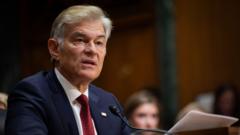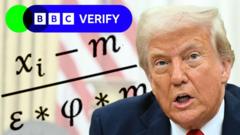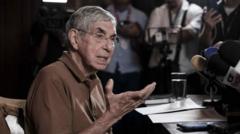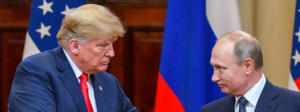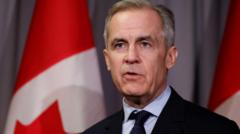New York prosecutors are seeking to postpone President-elect Donald Trump’s sentencing following his recent conviction for falsifying business records, suggesting that it should be deferred until he leaves office in 2029. Despite this move, Trump's legal team aims to overturn the conviction based on presidential immunity, complicating the path forward.
Trump Sentencing Postponed as Prosecutors Consider Public Interest

Trump Sentencing Postponed as Prosecutors Consider Public Interest
Prosecutors in New York propose delaying sentencing for President-elect Trump until after his term concludes, amid ongoing legal battles.
New York prosecutors have taken the step of suggesting that the sentencing for President-elect Donald Trump, following his conviction on multiple charges of falsifying business records, should be postponed until the end of his upcoming term. This proposal comes in light of ongoing discussions about the ramifications of Trump's legal status while he prepares to assume the presidency once again in January 2029.
The Manhattan district attorney's office has filed a request with Justice Juan Merchan, encouraging him to consider delaying any sentencing motions rather than dismissing the case entirely. The prosecution has set a new deadline of December 9 for the submission of motions, directly connected to Trump's upcoming presidency.
Trump's sentencing, originally set for November 26, 2023, may now face additional delays as legal proceedings remain active. Trump's conviction relates to a series of business record falsifications that unfolded in connection to an alleged hush-money scheme during the critical days leading up to the 2016 election.
Legal experts are split on the potential outcomes. Trump's representation contends that immunity from prosecution for a sitting president should apply in this context. The Supreme Court previously indicated some degree of immunity for presidents concerning official actions, yet the prosecutors argue that Trump's misdeeds were unrelated to his presidential responsibilities and should not be protected by this ruling.
Former Manhattan prosecutor Diana Florence raised doubts on whether Trump will face sentencing as scheduled. "I think there's less than half a percent chance that he'd be sentenced next week," she noted, given that the judge may lean towards accepting the proposed delay.
The various legal entanglements surrounding Trump add to the complexity of his situation; while the New York case is the only one to reach a trial and guilty verdict thus far, it remains to be seen how the legal landscape will shift as he transitions back into the White House. Political analysts and legal scholars continue to monitor how this unprecedented intersection of law and politics will unfold in the coming weeks.
As the legal battles continue, Trump's spokesperson has declared the situation a "total and definitive victory," highlighting the contentious nature of the legal proceedings against him. Moving forward, significant questions linger over the future of Trump's legal standing and its impact on his presidency.

